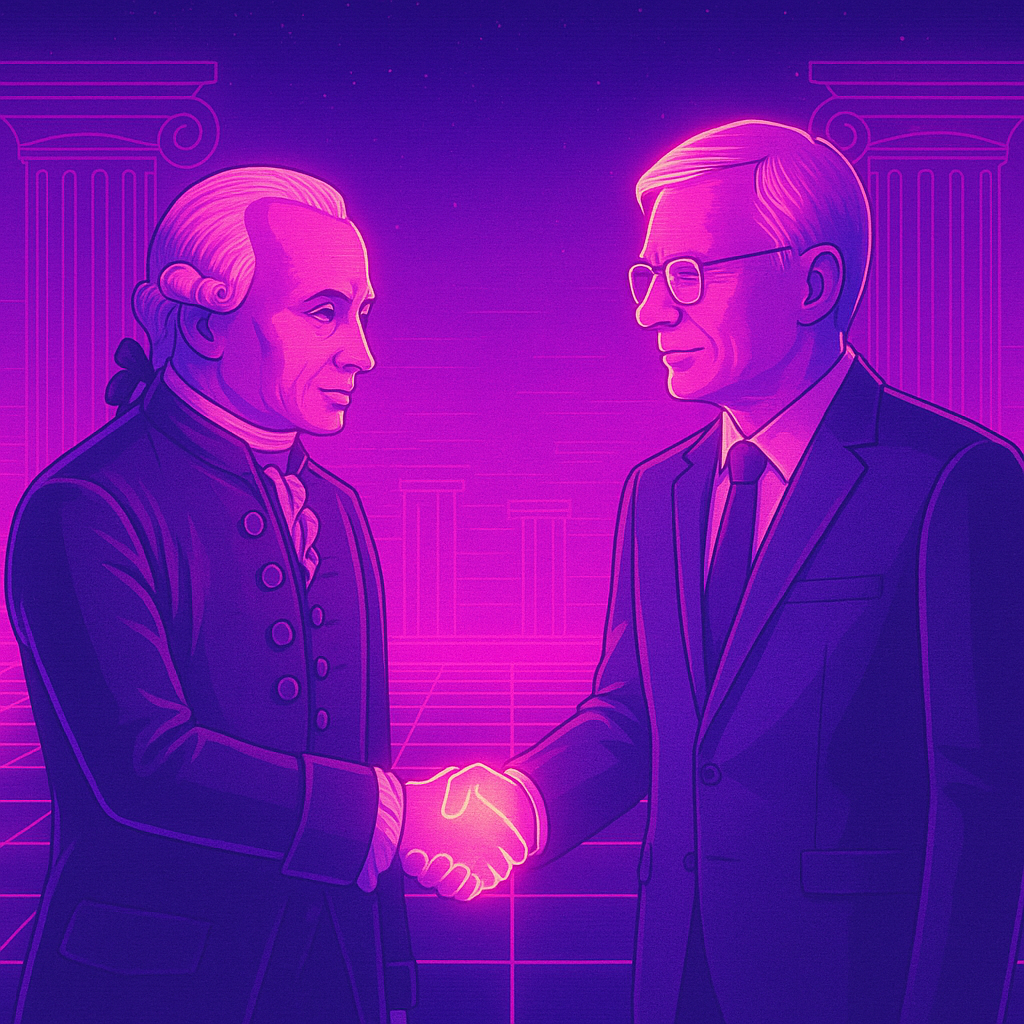Introduction Hans-Hermann Hoppe is widely known for his libertarian theory of argumentation ethics, a bold attempt to rationally prove the non-aggression principle (NAP) through the very act of engaging in discourse. While Hoppe explicitly distances himself from Kantian moral universalism and Enlightenment rationalism, a closer analysis reveals a deep irony: Hoppe’s framework bears a striking resemblance to the very Kantian foundations he claims to reject. In attempting to escape Kant, Hoppe inadvertently replicates much of his structure.
Kant’s Moral Universalism Immanuel Kant’s deontological ethics is built on the idea that moral law arises from reason itself. According to Kant, rational beings are bound by the categorical imperative: one must act only on maxims that can be universalized without contradiction. For Kant, morality is not about consequences but about rational consistency and respect for persons as ends in themselves. His philosophy hinges on the autonomy of rational agents and their ability to legislate universal moral laws through reason.
Hoppe’s Argumentation Ethics Hoppe, drawing heavily from Austrian economics and Rothbardian natural rights theory, attempts to ground libertarian ethics not in metaphysics or utilitarianism, but in the very structure of discourse. His core claim is that anyone engaging in argumentation necessarily presupposes norms of self-ownership and non-aggression. Denying these norms, he argues, results in a performative contradiction: one uses the norms of peaceful discourse to deny the right to peaceful discourse.
The Kantian Echo Despite Hoppe’s rejection of Kantian moral philosophy, his argumentation ethics mirrors Kant in several key ways:
- Rational Universality: Kant argues that moral norms must be valid for all rational agents. Hoppe insists that certain norms are necessarily accepted by all rational participants in discourse. Both approaches aim to derive universal rules from rational consistency.
- A Priori Reasoning: Kant’s moral laws are known a priori, through pure reason. Hoppe similarly posits that the libertarian ethic is discoverable a priori, as a condition of meaningful argumentation.
- Normative Implication of Rational Action: For Kant, acting rationally entails adherence to moral law. For Hoppe, arguing rationally entails adherence to libertarian norms. In both cases, reason entails obligation.
- Contradiction as Proof of Immorality: Kantian ethics tests moral maxims by asking whether their universalization leads to contradiction. Hoppe tests ethical denials by showing their performative inconsistency.
Hoppe’s Contradiction Hoppe attempts to maintain a value-free, praxeological method in line with Mises, while introducing normative content via argumentation ethics. Yet this move essentially reintroduces Kantian moral reasoning under a different name. By claiming that certain norms are inescapable for rational discourse, Hoppe smuggles universal moral norms back into libertarian theory — the very thing he sought to avoid.
Conclusion Hans-Hermann Hoppe may have turned away from Kant’s Enlightenment ethics, but his attempt to deduce libertarianism from argumentation bears unmistakable Kantian fingerprints. Argumentation ethics, like Kant’s categorical imperative, is an attempt to derive universal moral norms from the conditions of rational agency. In the end, Hoppe’s system is not a rejection of Kant, but a reinvention of him — cloaked in Austrian language and libertarian priorities.
Libertarians who admire Hoppe’s rigor might do well to revisit Kant, not as an adversary, but as a philosophical ancestor who laid the groundwork for reason-based ethics long before Rothbard picked up his pen.


Leave a Reply